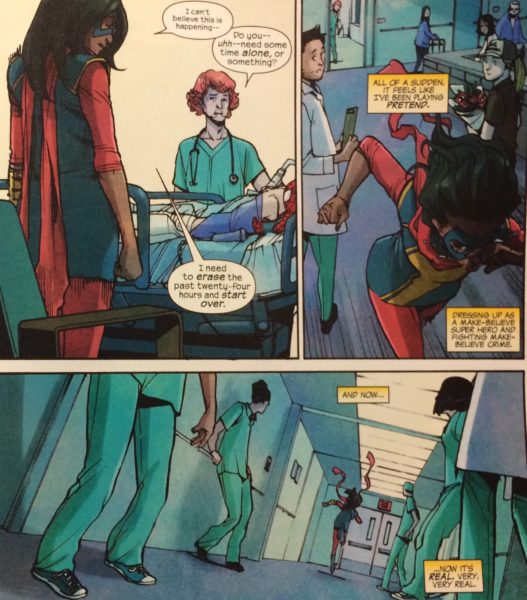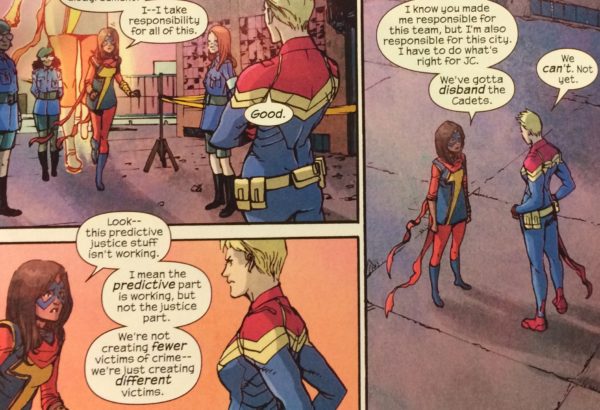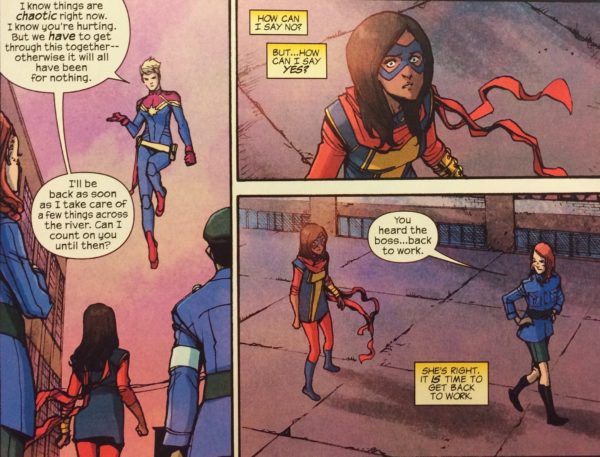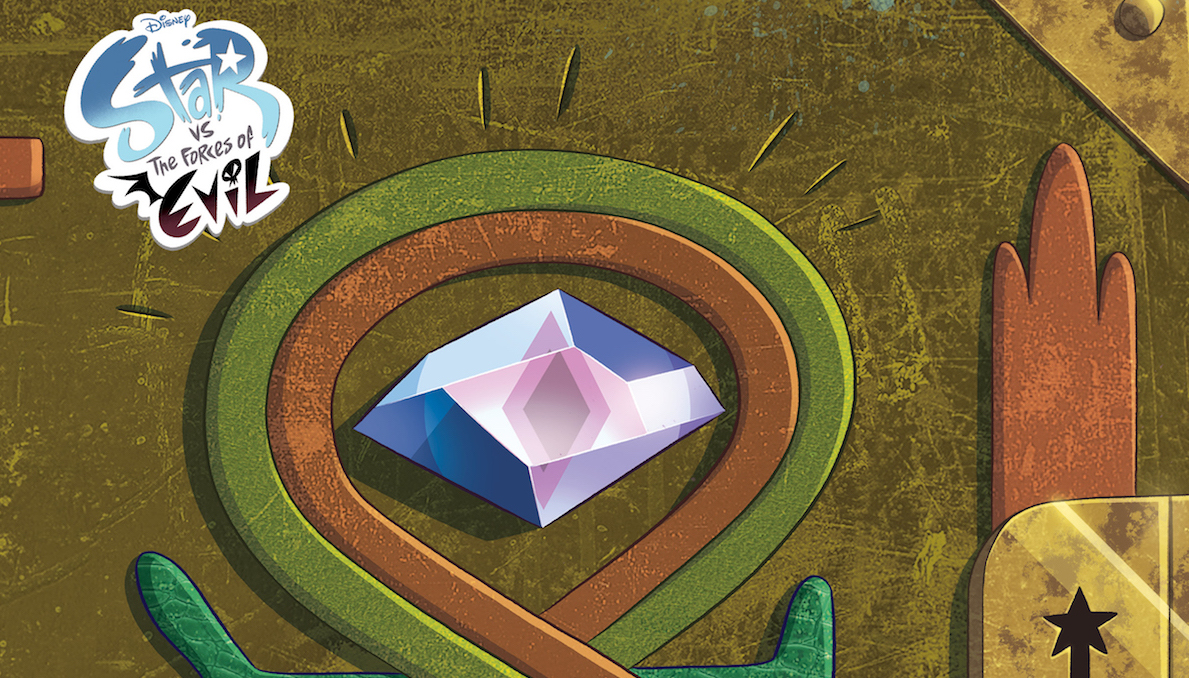
Kamala Khan (aka Ms. Marvel) stands with Carol Danvers in Civil War II. Of course she does. Carol is Kamala’s mentor. Her hero. The unfailing, unflinching paragon of right in Kamala’s hectic, confusing, conflicted world.
Kamala is desperate to live up to Carol’s expectations and so, she carries out Carol’s orders to enforce predictive justice. She does it, though, not so deep down, it feels wrong. She even goes so far as to arrest a friend, another kid, not even for a crime he hadn’t yet committed but for a mistake he hadn’t yet made.
Her best friend, Bruno, deeply troubled by the predictive justice model he sees taking over his city, the fear he sees growing, tries to sneak into the detention facility, for which Kamala is responsible. There is an explosion and Bruno is critically injured. The choice to attempt a prisoner rescue was his. That is his responsibility.
The choice not to shut down the operation when she felt the first stirrings of doubt was Kamala’s.
Prior to the attempted incursion, the only personal consequence of Kamal’s decisions was Carol’s approval or disapproval.

Now, due to a decision she made, Bruno may be dying.
Suddenly, “It’s real. Very, very real.”
The fact Kamala had far, far too much responsibility placed on her adolescent shoulders is also very real.
Are there people in the world who don’t take enough responsibility for their actions? Absolutely. Far too many. Do some of these folks teach their kids to act in a similar manner? Often they do.
Are children capable of being responsible for some things? For certain things? Absolutely and from a younger age than you might anticipate.
Responsibility, however, isn’t coded into our genome.
As adults, as parents, it’s our job to teach our children to acknowledge and to accept responsibility. It’s also our job to teach them to admit when they’ve failed in that task and to rectify the mistake whenever possible. It is our responsibility to teach them to listen to the still, small voice, even when said voice is telling them something they don’t want to hear, reminding them that sometimes, the right thing isn’t always easy, comfortable, or pleasant.
We must do all of this so when life gets real, our children can trust themselves to do the right thing.
Do I advocate helicoptering? No, I do not; it would give me a certain piece of mind but it isn’t of benefit to my kids. They need to test, to try, to explore. They need to make mistakes, even screw up royally from time to time. At the same time, the younger the child, the less complete and set a person that child is. Which is amazing and wonderful because they are so. very. Flexible. Much more flexible than we grown-ups are.
They are also so. Very. Fragile.
Pile on too much responsibility before the kiddo is ready and you run the risk of breaking something vital.
The amount of responsibility children can handle is entirely dependent on the temperament and strengths of an individual child. Advance too slowly and the kids come to expect everything to be done for them, expect to be able to do what they want, when they want, with no consequences. They develop an expectation there will always be someone else around to clean up their messes, be those disasters piles of toys or a totaled car. Advance too fast, though, and you risk anxiety and resentment, both of which inhibit progress and trust down the road.
Seriously, who decided this parenting thing should have so many trip-wires and booby-traps?
Only a parent who knows her children well can determine the degree of responsibility those kids are capable of accepting. How do we get to know them? Same way we get to know other adults. Spend time with them. Listen to them. Pay attention to their play, the questions they choose to ask, the books they want to read. Their fears, their dreams, their favorite part of the day. Their worries, their analyses, their thoughts on life, the universe, and everything.
Listen when they tell you something doesn’t feel right, when something makes them uncomfortable. When they think something is flat out wrong. Listen and acknowledge and help them assess. Help them forecast the possible consequences and the way those consequences are reflected by their choices, by cause and effect. Sometimes, we have to do things we’d prefer not to do, that’s part of life, but if they really think something is wrong, back their play. As long as they understand, they (and you) may have to pay a price for holding their stance.

Don’t put more on them than they’re able to carry. Chores? Sure. Homework? Absolutely. Helping with siblings, pets, meal planning and prep? As long as they have the motor and cognitive skills to match the task, then they should be helping. Your family is their family and everyone should take part as far as they’re able. Everyone should be responsible for its smooth function, its daily routines, the contentment of al members.
As they get older, they can participate more in scheduling, time management, and other more detailed and involved aspects of their routines. We can start to teach them to work what they want to do around what they need to do. How to budget their allowance or earnings from a part-time job. We can leave them in charge for the weekend or allow them to travel with friends.
Sometimes, we may go too far too fast. Some kids thrive in such milieu and others will need to pull back. Listen when they tell you it’s too much, that they’re not ready. That they’re uncomfortable or scared. Sometimes, they’ll need to make the leap anyway and that’s good and right.
Sometimes, they need you to show them how.
There is a limit to what we can ask of our kids. High expectations often produce children who will rise to meet them, certainly (sometimes I’ll tell you about teaching Kung-Fu to three-year-olds). But an eleven-year-old, even a seventeen-year-old, simply hasn’t had the life experience, the emotional experience, to navigate every scenario.
Kamala is an extreme case: still in high-school and already a member of the Avengers, already responsible for numerous lives. We see, as her story progresses, the ways in which she’s been affected by those responsibilities: she has lied to her parents, had periods of estrangement from family and friends. Her schoolwork has suffered. She has made mistakes out of utter desperation (recall, if you will, the episode of the multiple Kamalas). She’s been sucked into other dimensions, gone up against other Inhumans, against monsters, and supervillains.
(The moral ambiguity inherent in the child/teenage sidekick/hero is, at its root, problematic, but for the purposes of this piece, let’s put that aside, take it as given it is a Thing That Happens, and move on)
She has performed admirably, more so than many adults would (or do), has managed to figure out a sort of balance. Once conflict between Carol and Tony broke out, however, Kamala was asked to bear still more weight: the weight of being a soldier. To determine the ultimate fates of others. To command a battalion of other children with vague oversight and no real backup.
A war whose casualties now include the boy who has been her best friends since pre-school.
What Carol is asking of Kamala isn’t fair and it isn’t right. It is too much for a child, even a child with superpowers. As much as Captain Marvel is one of my favorite heroes, even I have to admit she is too wrapped up in Rhodey’s death, in her need to fix the world, to see what she’s doing to the kid who looks up to her, to see that she’s putting way, way too much of a burden on a teenager still trying to figure herself out.

Carol has discarded Kamala’s childhood without a second thought, without any consideration for the effect that loss may have on the kid she affectionately calls “Junior.”
I can’t believe I’m about to say this, but don’t be like Carol Danvers.
Yes, children need to learn responsibility. They need to learn what to do when life is “real,” how to make a choice and accept the consequences of that decision.
These are not skills they’re born with and they can’t learn them by osmosis.
They learn in stages, over time. They learn from us and from friends and teachers and all of the other people in their lives. It’s a skill they must practice and refine while they have a safety net. To experience and reach and fall.
All children also deserve a chance to be children.
A delicate balance to be sure, something of a bridge of swords. Establishing that balance isn’t their responsibility any more than the futures of potential evildoers should be Kamala’s. That later is Carol’s responsibility as a seasoned veteran.
The former? That one is ours.
And if we want them to learn, the only choice we can make is to take it.



Wow. Thank you for this article. It’s a good wake up call to pay more attention to our kids when they’re trying to tell us what’s going on with their lives. If you don’t listen, eventually they’ll stop talking to you entirely (I speak from the experience of a child doing this with his mom).
It can be really difficult to do though, especially when sometimes they are straight up talking just to talk. But making sure to have those moments when they can tell you serious stuff, or just something that’s on their mind can help them focus. My son is a talker, but often about the most inane stuff. However, we started doing a “say one good/not so good thing about your day” during dinner, and I think it’s help him. He now always makes sure that we do it, though he’s really good about making sure we each get a turn to start first. It wasn’t u til reading this article that I realized how important that time is to him. So thank you!